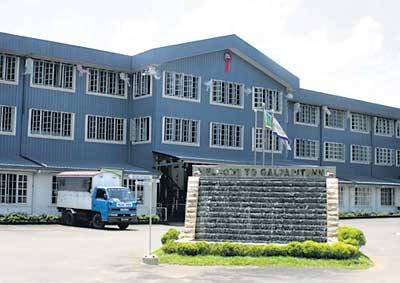
Upasena family and Asia’s biggest orthodox tea factoryLELLOPITIYA, Ratnapura - His family owned a tea business in Ratnapura but tea as a profession was far from Saman Upasena’s mind as he concentrated on studies, sports and being a college prefect at St Benedicts, Kotahena.
The gangly teenager was a good basketball player and captained his school before going on to represent Sri Lanka schools. “I owe it to school for the discipline, leadership and decision-making that helped me later (when going into the family business),” he recalled. He had no interest in tea but was also not sure about the future at the time his father pushed him into learning about the business. Starting to work at the factory at 22-years in 1987, Upasena learnt tea manufacture the hard way and four years later the Galpadithenna Tea factory, his family company’s biggest asset, became the single largest orthodox tea factory in Sri Lanka. Upasena has mastered the art of tea and all its processes so much so that he doesn’t fail to attend a single tea auction in Colombo – a rarity for a private tea factory owner. He tastes his own tea factory samples and walking into the tea tasting room – when we were visiting one Sunday - Upasena immediately went to a cup sipped the tea and with the usual slurping sound – like most tea tasters – felt the aroma in his mouth before spitting it out. “I know the difference in the flavours,” he says proudly. In a fine balance between family and work, he spends Monday and Tuesday in Colombo attending to family matters and meeting brokers and buyers in addition to attending the auction. His children are studying in Colombo. The rest of the week including Sunday, he works at the factory where he has an office.
The state-of-the-art factory is equipped with some of the finest machinery in the tea manufacturing industry which includes the Material Handling Mono Rail System and Automated Tea Rollers. It can process over three million kilos of made tea annually, successfully enabling it to win recognition as the single largest orthodox tea manufacturer in Asia since 2003. Upasena said the production process is fully automated ensuring the highest standards of quality and hygiene. The factory floors are clean with well drawn lines demarcating the ‘walking’ areas while all worker welfare facilities have been provided for. The factory pioneered the use of fully automated fermenting machines for orthodox tea and is the first to install a fully automated tea packing machine (which packs the made tea to its accurate weight to each sack, eliminating packing variance issues) amongst tea factories in Sri Lanka. “I was paid just Rs 1,500 in 1987 for working in the factory by my father,” Upasena said adding that when his father suffered a heart attack and was forced to rest in Colombo, he had to take over the running of the business.
The K.D.U. Group including the Galpaditenna Tea Factory, was founded by Upasena father’s K.D. Upasena who died in 2001 after seeing the organization blossom to embrace many more factories. K.D. Upasena’s wife, Karuna, was then appointed chairperson of the Group which saw the family enterprise expand to the Silver Ray restaurant, KDU Filling Station and a mini hydro power plant. There are five factories in the group run by Saman (Upasena) and his brother Thushan. Upasena says one of the biggest problems is a shortage of labour from the vicinity, forcing the factory to transport daily some 125 workers for three shifts from Embilipitiya, about 75 km away. “There are no workers here because they get better wages in other work like gem mining,” he said. One of the advantages to both the factory and the producers however is that Upasena deals directly with 12,000 smallholders who provide the green leaf from a 60 km radius. There is no middleman. The factory requires 400 workers but that would have increased to 650 if not for the fact that much of the work is automated. Now his wife and sons are toying with the idea of investing in mechanized gemming. “We are preparing some proposals,” Saman Upasena said. Reflecting on some of the issues in the tea industry, he said the costs are eternally rising. “Look … all our costs – power, labour, fertilizer, transport, etc have gone up substantially. It’s a tough survival game,” he said. Upasena is also dismayed at the way the Tea Cess funds are being disbursed. “We have not got a cent to upgrade our factories since 1994 although the cess is collected from us and the industry and is aimed at utilization by the industry,” he added.
|
|
||
| || Front
Page | News
| Editorial
| Columns
| Sports
| Plus
| Financial
Times | International
| Mirror
| TV
Times | Funday Times|| |
| |
Copyright
2007 Wijeya
Newspapers Ltd.Colombo. Sri Lanka. |


